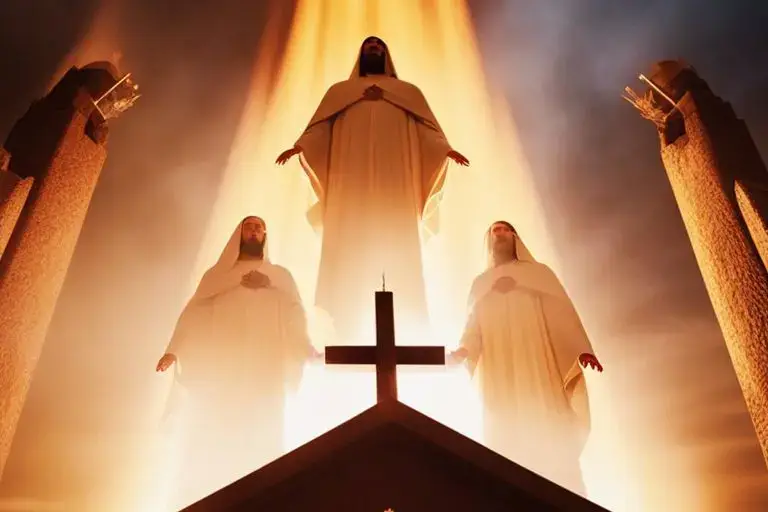
Introduction
Pentecost and the Holy Spirit are pivotal elements in Christian theology, playing crucial roles in the faith and practices of believers. Understanding these concepts is key to appreciating the depth of Christian worship and the vibrant history of the Pentecostal movement.
What is Pentecost?
Pentecost, derived from the Greek word “Pentēkostē” meaning “fiftieth,” is a significant Christian festival celebrated 50 days after Easter Sunday. It commemorates the descent of the Holy Spirit upon the apostles and other followers of Jesus Christ, as described in the New Testament.
Definition and Significance
Pentecost marks the birth of the Christian Church. It signifies the fulfillment of Jesus’ promise that God would send the Holy Spirit to guide and empower His followers.
Biblical References to Pentecost
The primary account of Pentecost is found in Acts 2:1-4. Other references include John 14:16-17 and Luke 24:49, which highlight the promise of the Holy Spirit.
world

The Holy Spirit in Christianity

The Holy Spirit is the third person of the Holy Trinity in Christian doctrine, alongside God the Father and God the Son (Jesus Christ). The Holy Spirit is often associated with God’s presence, power, and active involvement in the world
Definition and Role
The Holy Spirit acts as a comforter, guide, and source of inspiration and strength for believers. It is through the Holy Spirit that Christians experience God’s presence and receive spiritual gifts.
Biblical References to the Holy Spirit
Key scriptures include John 14:26, where Jesus speaks of the Holy Spirit as the Helper, and Acts 1:8, which emphasizes the empowering role of the Holy Spirit.
The Event of Pentecost
Pentecost is described in the Book of Acts, chapter 2, where the Holy Spirit descended upon the apostles, enabling them to speak in various tongues and proclaim the gospel boldly.
Description of the Event
The apostles were gathered in one place when a sound like a rushing wind filled the room, and tongues of fire appeared, resting on each of them. They were filled with the Holy Spirit and began to speak in different languages.
Key Occurrences During Pentecost
- The apostles spoke in tongues, understood by people from various nations.
- Peter preached a powerful sermon, leading to the conversion of about 3,000 people.
- This event marked the beginning of the Christian Church’s mission to spread the gospel.
Biblical References of Pentecost
Acts 2:1-4
“When the day of Pentecost came, they were all together in one place. Suddenly a sound like the blowing of a violent wind came from heaven and filled the whole house where they were sitting. They saw what seemed to be tongues of fire that separated and came to rest on each of them. All of them were filled with the Holy Spirit and began to speak in other tongues as the Spirit enabled them.”
Other Relevant Scriptures
- Joel 2:28-29: “And afterward, I will pour out my Spirit on all people…”
- Luke 24:49: “I am going to send you what my Father has promised; but stay in the city until you have been clothed with power from on high.”
The Birth of the Pentecostal Movement
The modern Pentecostal movement began in the early 20th century, emphasizing a personal experience of the Holy Spirit, akin to the events of the original Pentecost.
Early Beginnings
The movement is often traced back to the Azusa Street Revival in Los Angeles, California, led by William J. Seymour in 1906.
Key Figures and Milestones
- Charles Parham, an early leader who emphasized speaking in tongues.
- The Azusa Street Revival, which played a crucial role in spreading Pentecostalism.
How the Pentecostal Movement Spread
Global Expansion
Pentecostalism quickly spread beyond the United States to countries around the world, establishing a global presence.
Influential Events and Missions
- The rise of Pentecostal missions.
- The formation of Pentecostal denominations and networks.
Core Beliefs of the Pentecostal Movement
Baptism in the Holy Spirit
Pentecostals believe in a distinct experience called the “baptism in the Holy Spirit,” which empowers believers for service and witness.
Speaking in Tongues
Speaking in tongues is seen as the initial evidence of baptism in the Holy Spirit and a vital aspect of personal and corporate worship.
The Role of the Holy Spirit in Pentecostalism
Empowerment and Guidance
The Holy Spirit empowers believers to live holy lives, perform miracles, and evangelize effectively.
Spiritual Gifts
Pentecostals emphasize the operation of spiritual gifts such as healing, prophecy, and discernment.
Pentecostal Worship Practices
Style of Worship
Pentecostal worship is typically lively, expressive, and involves contemporary music, spontaneous prayer, and an openness to the leading of the Holy Spirit.
Common Practices and Rituals
- Regular prayer meetings and Bible studies.
- Emphasis on altar calls and personal testimonies.
Defining Characteristics of a Pentecostal Church
Worship Style
A Pentecostal church often features vibrant worship, with congregational participation and an emphasis on experiencing God’s presence.
Emphasis on the Holy Spirit
Central to Pentecostal identity is the belief in the active presence and work of the Holy Spirit in the life of the church and individual believers.
Biblical References Supporting Pentecostal Beliefs
Joel 2:28-29
“And afterward, I will pour out my Spirit on all people. Your sons and daughters will prophesy, your old men will dream dreams, your young men will see visions.”
1 Corinthians 12:4-11
“There are different kinds of gifts, but the same Spirit distributes them. There are different kinds of service, but the same Lord…”
Contemporary Pentecostalism
Current Trends and Statistics
Pentecostalism continues to grow rapidly, particularly in the Global South. It is estimated that there are over 500 million Pentecostals worldwide.
Prominent Pentecostal Leaders Today
Figures like T.D. Jakes of The Potter’s House and
Mark Pugh of Elim are notable contemporary Pentecostal leaders.
Misconceptions About Pentecostalism
Common Myths
- Misconception: Pentecostals only focus on speaking in tongues.
- Reality: While speaking in tongues is important, Pentecostals emphasize a broad range of spiritual gifts and practices.
Clarifications
Pentecostalism is diverse, with varying expressions and practices across different cultures and denominations.
Conclusion
Pentecost and the Holy Spirit are central to the Christian faith, representing the fulfillment of God’s promise and the empowerment of believers. The Pentecostal movement, with its rich history and dynamic worship, continues to play a significant role in global Christianity.
FAQs
What is the significance of Pentecost in Christianity?
Pentecost marks the birth of the Christian Church and the fulfillment of Jesus’ promise to send the Holy Spirit to empower His followers.
